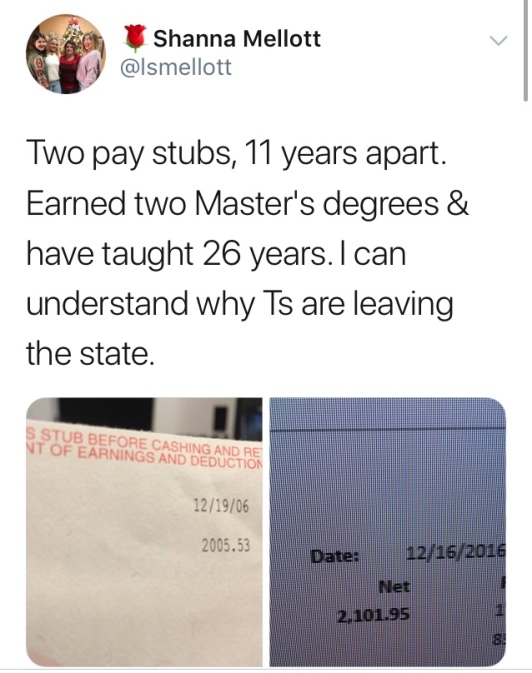Teachers have long been listed as part of what is called the “professional class.” Similar to the “middle class,” the professional class is the long time standard-bearer of capitalistic virtues and is often defined in contrast to both the upper or ruling class and the lower or working class. The shrinking demographic of the professional class of American society and the rapidly growing income inequality between the ruling and the working class is epitomized by the economic policies of the Trump presidency. The professional class is typically identified by three characteristics: 1. Post-secondary education 2. Presence of salary based pay and 3. Significant workplace autonomy. The increasing inability of teachers to enjoy lives that exhibit these three characteristics has given rise to what can accurately be described as the new “working class” teacher.
There are festering teacher shortage crises in numerous states where teacher pay is below regional averages. In Oklahoma, for instance, the teacher shortage has led to dramatic rise in both alternative certifications and emergency certifications. While all three forms of teacher certification in Oklahoma currently require a bachelor’s degree, the decline in university trained teachers with education degrees fits neatly into the long-term plan of corporate education reform to make the teacher obsolete in favor of technology. Great teachers can and do arrive at the classroom through all possible paths, but there is a direct connection between the educational requirements for a profession and the value our society places on that profession. As teachers become less valuable in the U.S. and more replaceable, they begin to withdraw from the professional class.
Teaching requires countless hours of attention beyond the school day and the classroom. There are always games to attend, papers to grade, and lesson plans to create. For this reason, teaching has always been, and for the most part continues to be, a salary based professional. However, corporate charters and even some traditional public school systems have implemented merit based pay, which is always accompanied by a lower base salary. It seems only a matter of time before some corporate machine like XQ or Teach For America begins touting the virtues of hourly based wages for teachers. In the meantime, many teachers turn to a second job for supplemental income. These second jobs are almost always hourly based and often minimum wage. A second job has the potential to be a healthy distraction for overstressed teachers. But a second job for teachers also has the potential to create a recipe for disaster, an untenable career ending burnout situation.
It seems only a matter of time before some corporate machine like XQ or Teach For America begins touting the virtues of hourly based wages for teachers.
Thanks to a bevy of standardized tests resulting from No Child Left Behind, teacher workplace autonomy has been on a steady decline for decades. Online textbooks, assessment tools, grade books, and academic games masquerade as teaching aids but ultimately function as corporate attempts to infiltrate every aspect of the teacher-student relationship. The end game of corporate education reform is for teachers to function as mere monitors of computer guided student progress. Until then, traditional classrooms will continue to enjoy a certain level of autonomy simply because, as of yet, billionaire reformers are not lining up to provide an actual physical presence in schools. Zuckerberg and Gates want the money, not the actual time spent with students. Teachers who are not allowed to teach will not feel like teachers and will find more fulfilling work. This process has already begun.

Oppression is built into the very existence of the working class, but there is nothing wrong with being working class. The working class makes the American machine run. The ruling and professional classes rely on the working class far more than they are willing to admit. The uneasiness in the teaching profession has to do with expectations. Aspiring teachers rightfully expect to be treated like professionals upon entering the classroom. Furthermore, college graduates should be able to enter a workforce that will provide the salary necessary to pay off acquired student debt. Increasing college costs and below average teacher pay is a hard sell to the next generation of teachers.
Oppression is built into the very existence of the working class, but there is nothing wrong with being working class.
To be sure, teaching is not poverty, not yet. Teacher pay in a state like Oklahoma, while certainly a gross injustice, is not the same as abject or generational poverty. Teachers at schools with high percentages of students from low-income households would do well not to think that their stagnant wages afford them a sense of economic solidarity with their students. There is no teaching “vow of poverty.” Using such a phrase to describe underpaid teachers is an offense to those living in true poverty. Likewise, given shifting societal attitudes toward education as a profession, the statement, “You knew what you were getting into,” does not apply either. Preservice teachers truly do not know what they are getting into. The future is uncertain, but at least one fellow education blogger and Badass Teacher, Steven Singer, is optimistic. We may soon be able to turn the tide in the fight against corporate education reform and restore the profession of teaching to its once highly esteemed position.

you left out the fact that attacks on teachers and on piblic education happened much more under obama than under any previous administration, D or R
ReplyDelete